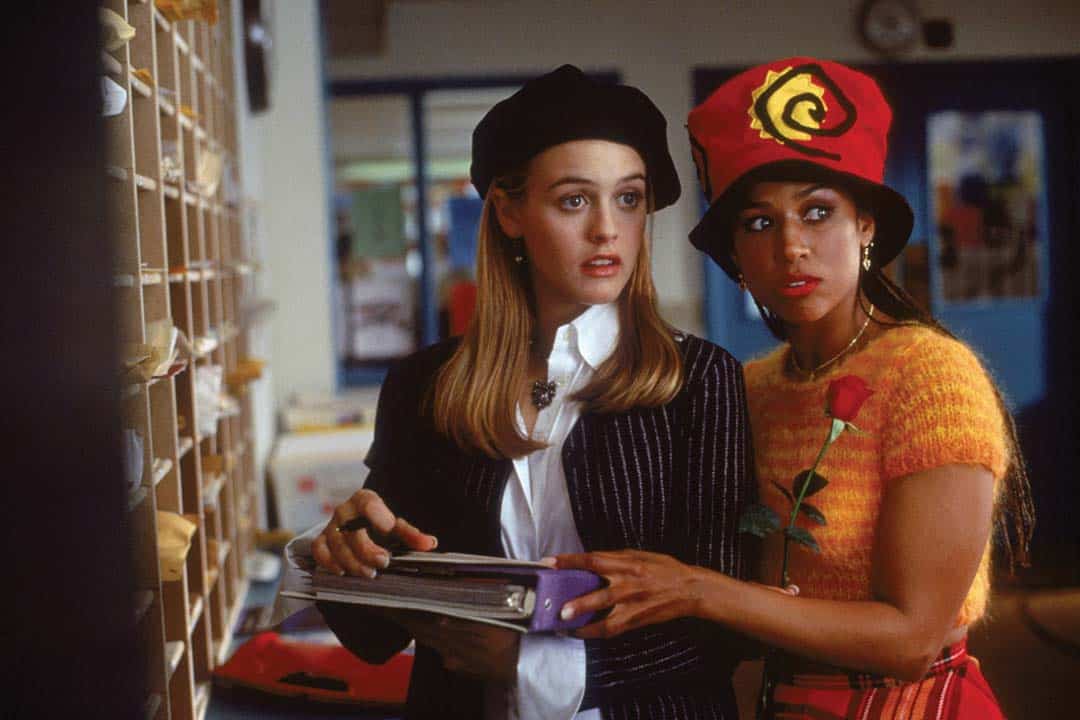Okay, so, I love Clueless (1995). I’ve probably seen it countless times, yet my enjoyment level never decreases. Although I am a fan of the rom-com genre, and always up to see teenagers act ridiculous, one would probably expect me to hate the movie. Every character is chock full of privilege-induced ignorance and would likely be unbearable to have an actual conversation with. Josh, Cher’s love interest and the one character with any semblance of societal awareness, is the classic white liberal whose convictions rely heavily on the fact that he will never actually have to struggle for anything. Despite all of this, I love Clueless and have taken to thinking about it too much.
There is obviously a heavy dose of satire present in the movie, with Alicia Silverstone delivering lines that are laughable in how close they get to Cher actually exhibiting self-awareness. One of the most absurd moments happens about five minutes in when Cher participates in a class debate about the Haitian refugee situation and, using the analogy of an overly full garden party, argues that, “If the government could just get to the kitchen, rearrange some things, we could certainly party with the Haitians.” Somehow, despite its ridiculousness, or maybe because of it, Clueless manages to make a lot of points that I agree with, while veiling itself in the musings of a silly teenager. Really though, aren’t all teenagers a bit silly?
Yet, among a series of brilliantly paced scenes, I think about this one scene incredibly often:
MURRAY: Woman, lend me five dollars.
DIONNE: Murray, I have asked you repeatedly not to call me woman.
MURRAY: Excuse me, Miss Dionne.
DIONNE: Thank you.
MURRAY: Ok but, street slang is an increasingly valid form of expression. Most feminine pronouns do have mocking, but not necessarily misogynistic undertones.
TAI: Wow. You guys talk like grownups.
CHER: Oh, well this is a really good school.
Dionne (Stacey Dash) and Murray (Donald Faison) are side characters in Cher’s shenanigans, providing levity or emotional revelations whenever she needs them, but the film nonetheless manages to make them relatively actualized individuals. One of the earlier mentions of their relationship comes when Cher compares them to Ike and Tina Turner, referencing the biographical movie What’s Love Got to Do with It (1993), which revealed the intimate details of an incredibly abusive relationship that devastated Tina. Through her series of critical essays in Black Looks: Race and Representation, bell hooks looks into Ike and Turner’s relationship, considering how Ike foisted upon Tina the image of sexual promiscuity that many Black women have been shackled with.
Cher supposedly only references the famous duo because of the frequent dramatics in her friend’s relationship, and likely because Ike and Turner were one of the few mainstream celebrity Black couples at the time. It is only in recent years that I’ve developed enough of a ’90s pop-culture background to understand why the reference is out of place in Clueless, a movie full of satire that rather successfully hits its target. There seems to be no thought or goal behind Cher’s line other than to reduce Murray and Dionne to the bare bones of their identities — their race — to make an ineffective joke. However, in a film where characters are teenagers typecast according to their social standing — jocks and skaters — Cher’s comment typecasts Dionne and Murray as Black in a reductive move reminiscent of common stereotypes, such as the Mammy or the Jezebel.
So, Murray’s retort to Dionne in the above scene was definitely written for laughs, but the longer I think about it, the longer I wonder whose laughs it was meant for. I wonder what audiences looked like when the movie first came out because I genuinely find that to be one of the funniest moments in the movie, but in a way that makes me feel like the joke was written for me — a Black girl — first, not for me as an afterthought. Yet, I’m still torn, because would any high school boy really have the words to express himself the way that Murray does in that moment? Or did he deliberately plan it to mess with Dionne? The possibilities are endless.
Much of Clueless is Cher simply stating things and expecting her friends to go along with her supposed brilliance. Perhaps this is why it is so unexpected that Murray would choose to both modify his behavior to please Dionne while managing to justify his linguistic choices. Amy Heckerling, the writer and director of Clueless, gives a Black teenage boy in a predominantly white institution the words to argue for the cultural significance of his street slang; that is why this scene sticks with me day in and out.
However, I can’t decide whether the way Murray expresses himself in the above scene is a testament to how frequently racialized students code switch or whether Heckerling, a white liberal who thinks that Cher would have grown up to be a liberal herself, chose to simply express her own thoughts through the vehicle of Murray. Does the language you use to defend your culture matter as much as what you are defending?
Personally, this scene is a source of much contemplation because every moment in Clueless that Dionne and Murray are in — apart from their fight at the beginning — is actually full of mutual love and care; the movie goes so far as to have Cher realize that she can learn about care and kindness from their relationship. So is Clueless revolutionary in its portrayal of a loving and nuanced Black relationship or is Murray’s voice hijacked to make an inaccessible argument that is straight from the voices of white liberals? And besides, are those two things even mutually exclusive?


